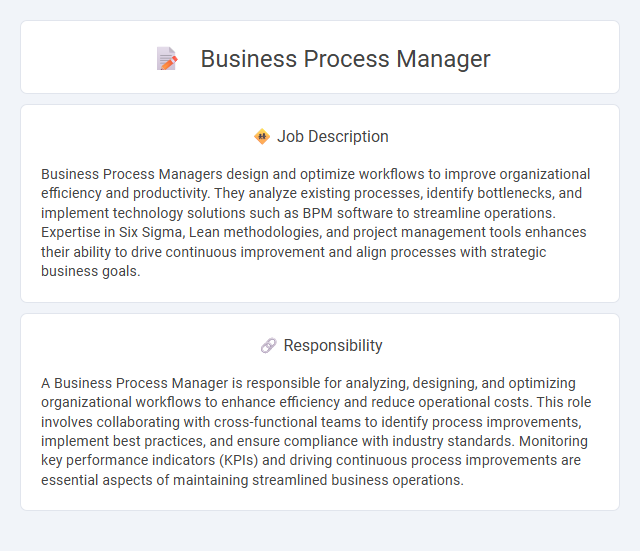
Business Process Managers design and optimize workflows to improve organizational efficiency and productivity. They analyze existing processes, identify bottlenecks, and implement technology solutions such as BPM software to streamline operations. Expertise in Six Sigma, Lean methodologies, and project management tools enhances their ability to drive continuous improvement and align processes with strategic business goals.
Individuals with strong analytical skills and a detail-oriented mindset may be well-suited for a Business Process Manager role, as the job likely involves evaluating and optimizing complex workflows. People who are comfortable with cross-departmental collaboration and change management could have a higher probability of success in this position. Those who prefer routine tasks or minimal interpersonal interaction might find the dynamic and strategic nature of this role less compatible with their working style.
Qualification
A Business Process Manager typically requires a bachelor's degree in Business Administration, Management, or a related field, with many employers preferring candidates holding certifications such as Six Sigma, Lean Management, or BPM Professional (BPMP). Proven experience in process mapping, workflow analysis, and project management tools like BPMN and Agile methodologies is essential. Strong analytical skills, leadership capabilities, and proficiency in process improvement software ensure effective alignment of business operations with strategic goals.
Responsibility
A Business Process Manager is responsible for analyzing, designing, and optimizing organizational workflows to enhance efficiency and reduce operational costs. This role involves collaborating with cross-functional teams to identify process improvements, implement best practices, and ensure compliance with industry standards. Monitoring key performance indicators (KPIs) and driving continuous process improvements are essential aspects of maintaining streamlined business operations.
Benefit
A Business Process Manager is likely to enhance organizational efficiency by streamlining workflows and reducing operational costs. They probably improve cross-departmental collaboration, leading to faster decision-making and higher productivity. This role may also increase customer satisfaction through consistent and optimized service delivery.
Challenge
Business Process Manager roles likely involve the challenge of continuously identifying inefficiencies within complex workflows to enhance operational performance. Navigating cross-departmental coordination may present difficulties in aligning diverse teams toward unified process improvements. Managing change resistance and ensuring adoption of new processes could also be significant hurdles in driving successful business transformation.
Career Advancement
A Business Process Manager plays a crucial role in analyzing, designing, and optimizing organizational workflows to enhance efficiency and productivity. Career advancement in this field often leads to senior management positions such as Director of Operations, Business Process Director, or Chief Operating Officer, with opportunities to influence strategic decision-making. Mastery of process improvement methodologies like Six Sigma and Lean, combined with strong leadership skills and data-driven insights, significantly accelerates progression to executive roles.
 kuljobs.com
kuljobs.com